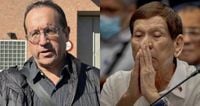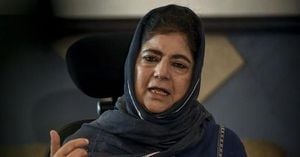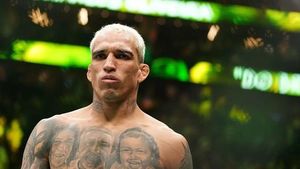Former Philippine President Rodrigo Duterte, now 80 years old, has spent more than five months in detention at the International Criminal Court (ICC) in The Hague, facing grave allegations of crimes against humanity stemming from his administration’s controversial war on drugs. As the September 23 confirmation of charges hearing looms, Duterte’s legal team has once again called on the ICC to grant his interim release to an undisclosed country, citing his age, health concerns, and the hardships of his prolonged confinement.
According to a recent report by ABS-CBN News, Duterte’s lawyers submitted a heavily redacted document to the ICC on August 19, 2025, urging the chamber to “order Mr. Duterte’s immediate release… subject to any conditions deemed appropriate.” This move marks the second time since June that Duterte’s camp has made such a request, underscoring growing concerns about the former president’s well-being as he awaits the next phase of his legal battle.
Duterte’s detention at the ICC follows accusations that he oversaw widespread human rights abuses during his presidency, particularly in relation to the Philippine government’s aggressive anti-drug campaign. The case has attracted international attention, with human rights advocates calling for accountability, while Duterte’s supporters argue that the charges are politically motivated and overlook the complexities of the Philippines’ battle against illegal drugs.
Vice President Sara Duterte, his daughter, has been among the most vocal advocates for her father’s interim release. She has repeatedly emphasized that the ICC detention facility cannot adequately meet the needs of her elderly father, whom she describes as a “super senior” citizen. Speaking to the media, she explained, “Not all the needs of former President Duterte can be provided inside the ICC detention facility.” She argued that house arrest, with the support of a private nurse or caregiver, would allow for better and more humane care.
The urgency of these appeals is further underscored by Duterte’s own wishes. According to his family, the former president has communicated a solemn request: if he were to die while in ICC custody, he wishes to be cremated. It’s a stark reminder of his age and the seriousness of his health situation, lending a deeply personal dimension to the ongoing legal battle.
But the legal maneuvering has not been without complications. Earlier this year, Duterte’s lawyers asked the ICC to pause its decision on the interim release request, stating they were still awaiting additional documents and information to support their appeal. British-Israeli lawyer Nicholas Kaufman, representing Duterte, has played a central role in these efforts, navigating the intricate legal requirements of the international court and the sensitivities of a high-profile case that has divided opinion both in the Philippines and abroad.
The timing of the latest appeal is no coincidence. With the confirmation of charges hearing set for September 23, Duterte’s legal team is seeking to secure his release—or at least a less restrictive form of detention—before the proceedings move forward. In their recent filing, they made clear that Duterte’s physical presence at the hearing could be waived, or alternatively, ensured via videoconferencing. “Mr. Duterte’s presence at confirmation proceedings may be waived but, if necessary, may equally be ensured by way of videoconferencing,” the redacted document stated, as reported by ABS-CBN News.
This flexibility, they argue, addresses any concerns about flight risk or the integrity of the proceedings, while still prioritizing Duterte’s health and dignity. The legal team’s request for release is “subject to any conditions deemed appropriate” by the ICC, signaling their willingness to accept strict supervision or other safeguards if necessary.
The case has also seen its share of procedural disputes. At one point, Duterte’s camp sought to have ICC prosecutor Karim Khan disqualified from the case, raising concerns about impartiality. However, the prosecutor firmly rejected this bid, maintaining his role in the ongoing investigation and prosecution. This back-and-forth reflects the high stakes and contentious nature of the proceedings, with both sides maneuvering for advantage ahead of the crucial September hearing.
Supporters of Duterte, including several political allies in the Philippines, have echoed the call for more humane treatment, with some advocating for house arrest on humanitarian grounds. They point to his advanced age, health conditions, and the psychological toll of prolonged social isolation. Critics, however, warn that granting interim release could set a dangerous precedent, undermining the ICC’s ability to hold powerful figures accountable for alleged human rights abuses.
The broader context of the case is impossible to ignore. Duterte’s war on drugs was one of the defining—and most divisive—features of his presidency. While it was credited by some with reducing crime and restoring order in certain communities, it drew widespread condemnation for its alleged extrajudicial killings and disregard for due process. The ICC’s investigation represents one of the most significant international efforts to scrutinize the conduct of a sitting or former head of state in the Philippines, and its outcome could reverberate far beyond the country’s borders.
For the Filipino public, the spectacle of a former president detained abroad and facing trial is unprecedented. It raises difficult questions about justice, accountability, and the balance between national sovereignty and international human rights norms. Some observers see the case as a test of the ICC’s resolve and credibility, while others view it as an overreach that risks inflaming nationalist sentiment in the Philippines.
Meanwhile, Duterte’s legal team is pressing ahead, determined to secure the best possible outcome for their client. The next few weeks will be critical, as the ICC considers the renewed request for interim release and prepares for the confirmation of charges hearing. All eyes will be on The Hague as the international court weighs the competing demands of justice, compassion, and the rule of law.
As the clock ticks down to September 23, the fate of Rodrigo Duterte hangs in the balance—caught between the demands of international justice and the realities of age, health, and the enduring divisions of Philippine politics.




